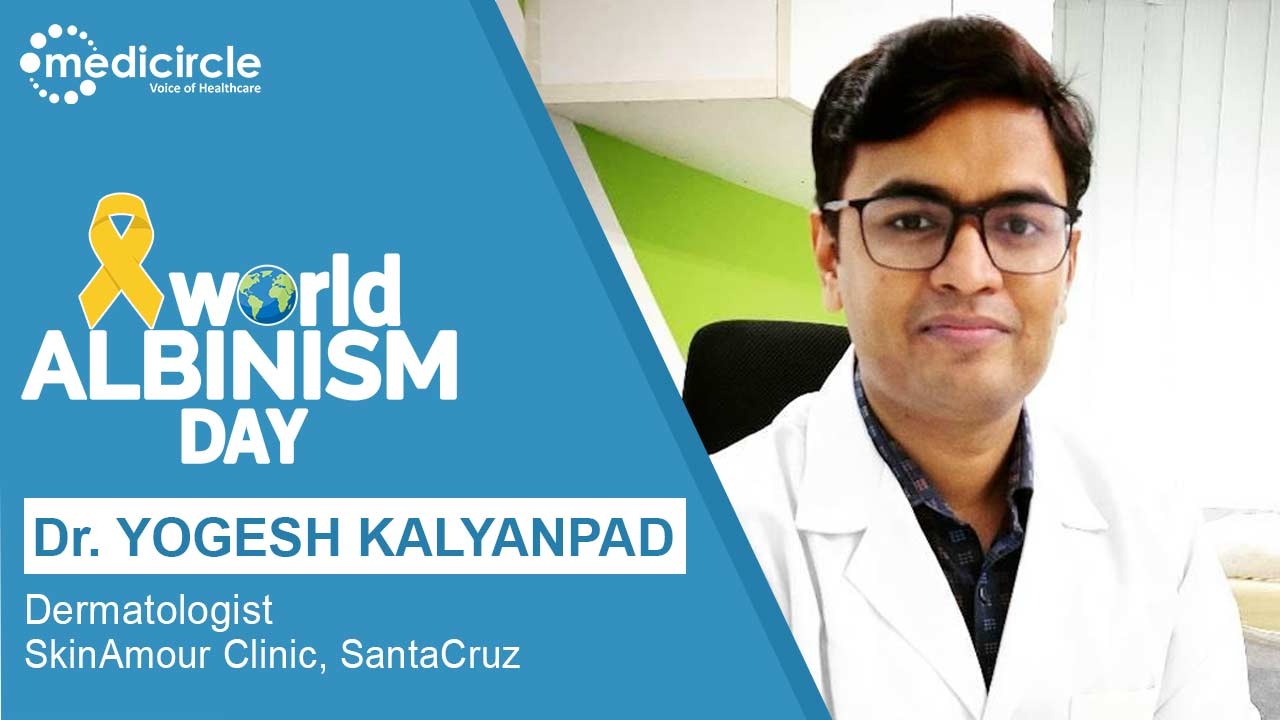Albinism is a rare disease according to the National Institutes of Health. It is characterized by a lack of melanin pigment in skin, hair, and eyes. Those with this condition are vulnerable to sun exposure as it increases the chances of skin cancer and severe visual impairment. International Albinism Awareness Day is observed every year on June 13, to highlight the rights of those born with albinism and increase awareness about this genetic condition. We at Medicircle, are conducting a series on this International Albinism Awareness Day to create understanding and prevent any misinformation against those who have it.
Dr. Yogesh Kalyanpad is a Dermatologist Cosmetologist and Hair transplant surgeon and has experience of 10 years in clinical dermatology and cosmetology. He has completed his MBBS and MD from KEM Hospital in Mumbai. He currently practices and owns SkinAmour Clinic in Santa Cruz, Mumbai. He is a life member of the Indian Association of Dermatologists, Venereologists, and Leprosy. Dr. Yogesh has mastered techniques of hair transplant and also provides services like Botox and Filler injections, PRP, Acne management, Chemical peeling.
Albinism - Hereditary condition
Dr. Yogesh says, “Albinism is a hereditary condition. And in these hereditary conditions, it's an autosomal recessive disease, which means it has to be from both the parents to get expressed in the individual. That's why the incidences are so low. Most of the people are confused with other conditions that also lack skin color, which is melanin, with albinism. It is a genetic hereditary issue and not acquired.
Dr. Yogesh mentions, “It is more commonly present in Sub Saharan countries like African countries and there the incidences can be 1 in 5000 to 1 in 10,000. But in the Indian continent, it is 1 in 17,000 to 1 in 20,000, which is a bit lesser as compared to the other countries.
Albinism affects eyes, skin and hair
Dr. Yogesh explains, “Albinism itself is the condition where the patient’s body fails to produce the melanin. Melanin is not only present in the eyes, but skin and hair also. So, all three areas will get affected. The melanin present in the eye sights defense from the excess sunlight. So, these patients are more prone to photophobia, whenever they go in harsh sunlight or excess sunlight, they find difficulty in focusing. They can also develop nystagmus that is rapid eye movement as lack of melanin can also cause retinal pigment problems. They can also develop amblyopia over some time because these nerves which are carrying images to your brain are not properly developed, one can face a decrease in sightedness as well. All these issues are very common and seek a lot of advice from the Ophthalmologist. So they need to take care of their eyes and need frequent Ophthalmologist visits.”
Albinism has got no cure
Dr. Yogesh expresses, “For albinism, there is no cure. Because it's a genetic disease, treatment can be provided for the prevention of diseases that they are likely to develop. They can develop some skin cancers which are very common because they don't have the defensive melanin in them. So, if they are exposed to harsh sunlight, they can develop skin-related issues. Lifespan can be shortened as skin malignancy is very common in these patients. It is very difficult to identify skin malignancies in them because even the melanoma looks very pinkish. The patient requires routine checkups with a Dermatologist and Ophthalmologist and can easily have a normal lifespan. They can take precautionary measures to lead a normal life.”
(Edited by Renu Gupta)

 Albinism is a hereditary condition. The body fails to produce melanin that affects skin, hair, and eyes. As there is no cure, patients are likely to develop other skin, eyes related issues but they can take necessary precautionary measures to lead a normal life" Dr. Yogesh Kalyanpad, Dermatologist
Albinism is a hereditary condition. The body fails to produce melanin that affects skin, hair, and eyes. As there is no cure, patients are likely to develop other skin, eyes related issues but they can take necessary precautionary measures to lead a normal life" Dr. Yogesh Kalyanpad, Dermatologist










.jpeg)







.jpeg)

.jpg)










